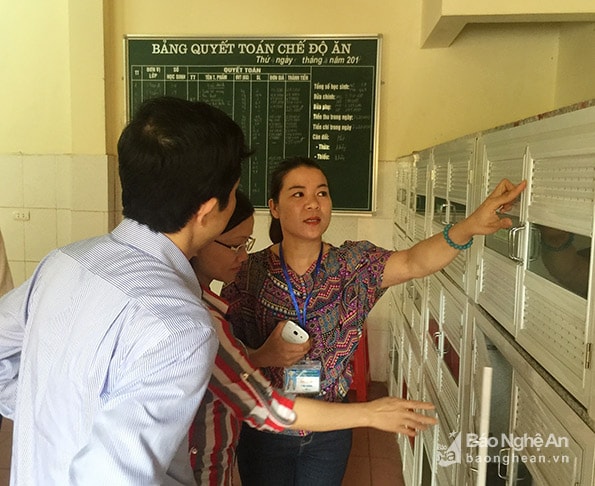Do Luong Town Kindergarten: The current level of autonomy is about 30%.
(Baonghean.vn) - Ms. Duong Thi Nam - Principal said that the school's current autonomy level is about 30%, however the school's operating budget still faces many difficulties.
On the afternoon of April 5, the Supervisory Delegation of the Provincial People's Council's Legal Committee on the implementation of the autonomy mechanism in public service units, headed by Ms. Thai Thi An Chung - Deputy Head of the Committee, had a working session with Do Luong Town Kindergarten. |
Do Luong Town Kindergarten is a national standard school level II. Since September 2011, the school has been converted from a semi-public school to a high-quality public school with partial autonomy in operating costs. Currently, the school has 35 employees (of which 28 are on the payroll and 7 are on labor contracts according to Circular No. 09/2013/TTLT-BGDĐT-BTC-BNV); 9 cooks (contract workers for cooking) and 1 security guard. The total number of students is 532 with 16 groups of classes, 100% boarding.
 |
| The monitoring delegation visited the kitchen facilities of Do Luong Town Kindergarten. Photo: Thu Nguyen. |
In recent times, the school has actively mobilized socialized resources and state budget to invest in upgrading facilities, creating spacious and clean classrooms, creating playgrounds and training areas for children; the kitchen is equipped with modern facilities, the food provided has clear origin and source, in addition, the school also takes advantage of the land fund in the campus to grow green vegetables to provide for the children's meals.
The school’s teachers and staff are competent, dedicated and enthusiastic about their work. Thanks to that, the school is a trusted address for parents in the area to send their children. The size of the school and the number of students have increased in recent years.
At the working session, members of the monitoring delegation raised many issues related to the implementation of the autonomy mechanism in schools such as: the effectiveness achieved from socialization work in schools and the development of plans to mobilize socialized resources; the use of regular state budget funds and retained tuition revenue; additional income and implementation of welfare funds for teachers and staff in schools; the current level of autonomy of the unit; the development of job position projects and autonomy plans; teacher contracts; tuition fees; the school's joint ventures and partnerships with organizations and individuals to carry out service activities...
Speaking to the Supervisory Team, Principal Duong Thi Nam said that the school's current level of autonomy is about 30%. However, the school's operating budget is still facing many difficulties because it can only retain 10% of tuition fees and 17% of the state budget for other expenses, making it difficult to ensure school activities.
The number of teachers per class is not enough according to regulations, affecting the care and education of children. The school has to pay for the contracted cooking labor from tuition fees and agreed sources collected from parents, but has not received funding from the state budget. Due to limited funds, the school has no additional income or welfare fund.
Concluding the meeting, Ms. Thai Thi An Chung highly appreciated the school's proactiveness and positivity in mobilizing investment, contributing to building facilities, improving the quality of child care and education; strictly implementing regulations on school organization; implementing transparent and correct revenue and expenditure; and effectively managing and using teachers and staff.
At the same time, Ms. Chung suggested that the school should soon develop and submit for approval a project on job positions and autonomy plans; have a plan and roadmap to gradually increase the level of financial autonomy to autonomy in regular spending; strengthen the management of the teaching staff, and if necessary, labor contracts must be implemented in accordance with regulations; manage revenue sources and use savings to increase income, create career development funds, welfare funds, and reward funds in the school.
Thu Nguyen
| RELATED NEWS |
|---|


